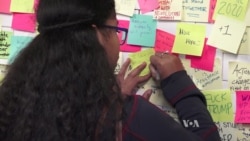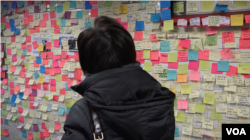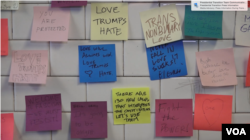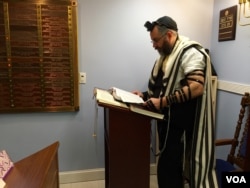New Yorkers can be expressive people, particularly when they are upset.
Following last week's presidential election, residents of the city that voted strongly for Hillary Clinton could be seen across subway platforms, in cafe windows, and on city benches wearing variations of the same look: grief, disbelief, despair at the prospect of a Donald Trump presidency.
But throughout Manhattan, chin-on-palm pondering quickly evolved into conversation and action: massive protests on the streets — and beneath the city's surface, an outpouring of words and emotions on sticky notes.
"Subway Therapy," a concept coined by Brooklyn-native Matthew Chavez, came alive on November 9 — the day after the U.S. election — inside New York's bustling Union Square station.
The idea was simple: Chavez handed out blank sticky notes, and New Yorkers jotted their thoughts, individually posting them on the station's square tiles.
One week and many hundreds of notes later, the wall had taken on its own life.
"We stand for peace," read one.
"We will overcome."
"Love is love is love."
Others were more directly aimed at the city's diverse community:
"Protect each other from hate."
"We're all New Yorkers. We GOT your back!"
"IMMIGRANTS MAKE AMERICA GREAT."
'Third worst day'
David Johnson, who moved to the United States from England 40 years ago, asked me to read him some of the notes, citing his bad eyes.
Hunched forward on his walking cane, Johnson listened close.
"We [heart] immigrants," I read. "#NotMyPresident"
"Good, good," he interrupted, nodding. Johnson told me that last week's election was the third worst day of his life. "The Kennedy assassination, the falling of the twin towers, and him.
"It affected my psyche, my health, everything," he paused, emphatically. "I don't know how Obama was so civil toward him. I want to hit him with my stick, man! God …"
Too young to vote, Maritai Evans added a yellow note to the mix.
"I love my baby so much," she had written, a post dedicated to her boyfriend.
"It makes me feel like people actually have a voice and it's coming out," said Evans, of the city's outpouring of emotion. "One day it will fully come out, and when it does, it will be a big blast. And we won't be able to shut it down."
On Staten Island, an alternate reaction
While Manhattan and much of New York City was a presidential stronghold for Democrat Hillary Clinton, Staten Island — the city's least populous borough — awarded Donald Trump approximately 57 percent of its vote, according to the city's Board of Elections.
Twenty-five kilometers southwest of Manhattan, a Jewish congregation called "Toras Emes," sits near the edge of the island. At a Sunday morning gathering of predominantly Russian men, politics is tricky territory, but they lean toward Trump.
Rabbi and spiritual leader Yochanan Ivry admits he often plays referee. "There's a famous expression, 'Two Jews, three opinions,'" Ivry said. "They say, 'Is God a democrat? Is God a Republican?' And I say, 'God is both.'"
His hope for his congregation and the country is to have the ability to talk about politics in a civilized manner, especially in moments of upheaval and uncertainty.
Herman Herskovic, who was born in the Soviet Union, came to the United States during President Richard Nixon's administration.
His values can be summed up by the golden rule: "Do unto others as you would have them do unto you." He believes the 45th president will be good for Israel and human issues. Just as importantly, he trusts Trump.
"I have listened to his children, and they impressed me very much," Herskovic said. "I think they have some kind of influence on their father, or vice versa."
Herskovic has concerns about some of Trump's rhetoric, along with cases of xenophobia and racism that have played out in communities across the nation, but believes it will be "straightened out." He places his trust in the U.S. constitution and its system of checks and balances.
"I don't think that everything he said is going to materialize, especially those outrageous things that he said," Herskovic said.
"And what if they do?" I asked.
"No, they won't," he replied, assuredly. "I just don't see it."

















